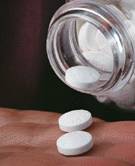Aspirin Reduces Asthma Risk Among Older Women
Study found 10 percent fewer new cases over a decade.
By Amanda Gardner
HealthDay Reporter
|
E-mail this article
Subscribe to news
Printer friendly version
|

(SOURCES: Tobias Kurth, M.D., Sc.D., associate epidemiologist, Brigham and Women's Hospital, and assistant professor, medicine, Harvard Medical School, Boston; Len Horovitz, M.D., pulmonary specialist, Lenox Hill Hospital, New York City; March 13, 2008, Thorax)
THURSDAY, March 13 (HealthDay News) -- Taking a small dose of aspirin every other day seems to reduce the risk of developing asthma among older women.
The study, appearing in the online issue of Thorax, essentially mirrors a similar study in which men taking aspirin saw the same reduced risk.
But the study authors warned that the research was still not enough to recommend taking aspirin regularly.
"These two studies are not sufficiently strong to make a recommendation for primary prevention of adult-onset asthma," said Dr. Tobias Kurth, who was involved in both studies.
For the many older adults already taken aspirin for its salutary effects on heart health, "this could be an added benefit," he added.
The incidence of asthma is on the increase, possibly due to obesity, dietary factors, exposure to antigens and environmental factors. But the trend also coincides with a decreased use of aspirin as people have switched to other over-the-counter pain relievers, or have avoided aspirin use in children due to concerns about Reyes syndrome.
That led some researchers to wonder whether the reduction in aspirin use was contributing to the rise of asthma.
This study, the first randomized trial in women, looked at almost 40,000 healthy, female health-care professionals aged 45 and over who were participating in the Women's Health Study.
Women were randomized to receive 100 milligrams of aspirin every other day or a placebo. This dose was much lower than that taken by men in the previous study (325 milligrams).
Over the next decade, there were 10 percent fewer new cases of asthma in the women who had been taking aspirin regularly, with one exception: aspirin had no effect in women who were obese.
"It could be due to the low dose, or there may be a biological reason," said Kurth, an associate epidemiologist at Brigham and Womens Hospital and assistant professor of medicine at Harvard Medical School, both in Boston.
"It may be a dose-related issue," added Dr. Len Horovitz, a pulmonary specialist with Lenox Hill Hospital in New York City. "It's basically like a baby aspirin."
The effect in non-obese women was smaller than that seen in men (they saw a 22 percent risk reduction), but that may be at least partly attributable to the lower dose.
Interestingly, aspirin can exacerbate symptoms in 4 percent to 11 percent of people who have already been diagnosed with the condition.
"It's not usual for us to encourage people to take aspirin, because you don't know who does or does not have [this sensitivity] until you have a problem," Horovitz said.
At this point, it's not clear exactly why aspirin has this effect.
More information
Visit the U.S. Centers for Disease Control and Prevention for more on asthma in women.
Copyright © 2008 ScoutNews, LLC. All rights reserved. 
HealthDayNews articles are derived from various sources and do not reflect federal policy. healthfinder.gov does not endorse opinions, products, or services that may appear in news stories. For more information on health topics in the news, visit the healthfinder.gov health library.